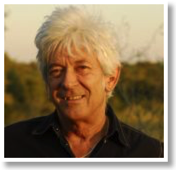January 2015
A Diverse Life

Eventually, Mac decided to start his own band, the Bump Band, and he began to write and produce his own music. He also recorded and performed with music legends the Rolling Stones, Bob Dylan, and Bruce Springsteen. In 2012 The Faces were voted into the Rock and Roll Hall of Fame.
From the 1960's, when he first started his musical career, to the present, Mac lived for the sound of music. This past December, McLagan had a stork and passed away the following day in the hospital, according to his website IanMcLagan.com. This emailed 2014 interview was his last with Jupiter Index.
Olivia Lin: You are an artist in many senses of the word: you’re a published author, a talented painter, and, of course, a phenomenal musician. Do each of your artistic outlets influence and inspire each other? If so, how?
Ian McLagan: They seem to be quite separate. Writing, painting and songwriting are all solitary pursuits, but performing music is totally the opposite. I always listen to music when I paint, but I like to paint as a break from creating music. Inspiration comes when it does, and I jump on that train as soon as I can.
An impressive list of musicians have had the pleasure of working with you in the past; who else can you think of that you possibly would like to get the opportunity to collaborate with in the future?
No one comes to mind. I’m not much of a collaborator, but I’d like to have my songs covered by some great singers.
Overall, which do you prefer more and why: recording in the studio or recording live?
I prefer to record in the studio, recording live is a brain twister, because you have to think of the audience as well as the recording.
What were your first five records you owned and what made the music, the lyrics and the playing unique for you?
These were all albums, CDs hadn’t arrived yet.
Buddy Holly. Great songs Muddy Waters ‘Newport 1960’. The Faces would only have had a few songs to play without this album.
Howling Wolf ‘Moanin’ In The Moonlight’. The Muleskinners, my first band backed The Wolf several times, and he and Hubert Sumlin both signed my copy of the album.
Little Richard. Incredible voice.
Fats Domino. Love his voice.
No man is an island; who would you say have been your music’s greatest influences over the years?
All the blues guys, Muddy, Wolf, Jimmy Reed, Little Walter, and Otis Spann & Johnnie Johnson on piano, and Booker T Jones & Billy Preston on Hammond.
When either writing or performing your music, where do you most frequently look for inspiration?
Women.
You have been a part of many music groups and collaborations. What would you say is the key to successfully working with fellow musicians productively?
A good sense of humour is essential. The same as with a marriage.
From your art to your journey to your charity work to your music you inspire and touch the hearts of many people. What else do you have to say to our readers and young musicians everywhere about leading a fulfilling and diverse life?
The idea is to have fun playing music, so I always try to pick people that are easy company to be around, as well as talented.
by Olivia Lin


